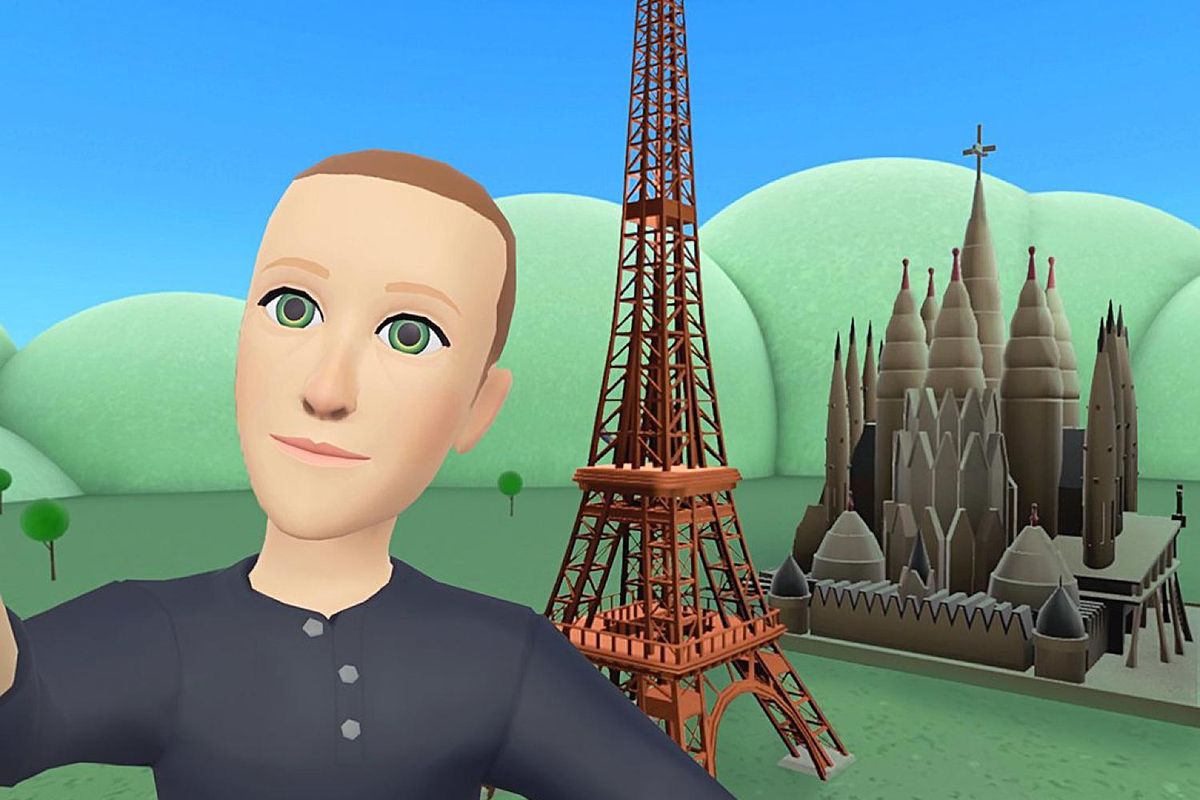Mark Zuckerberg isn’t a great ambassador for the metaverse.
Meta’s CEO kicked off another round of controversy with a screenshot celebrating the launch of Horizon Worlds, the company’s AR/VR metaverse platform, in France and Spain. Shot in the style of a selfie, it shows a poorly detailed rendition of Zuckerberg’s avatar staring past the camera. Crude 3D models of national landmarks sit behind him on a generic green landscape.
“It was a horrific PR move to put out those photos,” says Stu Richards (a.k.a. Meta Mike), partner success lead at GigLabs and cdofounder of Versed.
Meta’s metaverse hype leads to real-world backlash
Zuckerberg’s virtual selfie quickly went viral across numerous social media accounts. A tweet by user @ordinarytings, which claimed Horizon Worlds is “surely dying in the dark,” led the charge with more than 31,000 likes and over 4,500 quote tweets or retweets.
It’s not unusual for a tech CEO to receive a thrashing on Twitter, but the scale of the response–boosted by Mashable, The Daily Dot, and Kotaku–was suffocating. It’s hard to mount any defense of Meta’s ugly, simplistic screenshot. “I think the response is fair,” says Richards. “I’ve not been super impressed by what they’ve put out.”
Clearly, Zuckerberg’s post did not go as planned. But this raises the question: why?
“If they’re going to use game tech to build a VR game platform that’s supposed to be a cross between a Roblox-style UGC platform and a social MMO, maybe they should have people who have experience.”
—Rafael Brown, Symbol Zero
Rafael Brown, CEO of metaverse event company Symbol Zero and former game designer, thinks the company’s metaverse issues are rooted in difficulty keeping up with the level of fidelity common in the game industry.
“Facebook is out of touch with game-style software-development practices and expectations on art direction and character/avatar development,” says Brown. “Keep in mind their other internal projects like Quill, et cetera, that they’ve jettisoned and lost [staff over].”
Brown points out that Meta’s avatars have changed numerous times since the company’s purchase of VR hardware maker Oculus in 2014. These changes can be witnessed in other, past controversies, such as Zuckerberg’s ill-advised AR tour of Puerto Rico in the wake of Hurricane Maria. The avatars used then are different from today’s and radically different from the ghostlike avatars shown by Oculus in 2016.
This is how the Oculus avatars looked in 2016.www.youtube.com
There are other signs of instability. Meta’s VP of Horizon, Vivek Sharma, recently said he’s leaving the company for “a new opportunity.” Days later, the company announced it will shut down the Facebook Gaming app, a competitor to Amazon’s live-streaming platform Twitch, which eliminates an important avenue Meta could use to reach users.
“All I wonder is, if they’re going to use game tech to build a VR game platform that’s supposed to be a cross between a Roblox-style UGC platform and a social MMO, maybe they should have people who have experience,” says Brown. “They really need better art direction, technical art direction, game direction, and tools direction.”
Where does Meta go from here?
Zuckerberg tried to quell criticism with a follow-up post about a planned update to avatar graphics. It’s an improvement, to be sure. But the real glimmer of hope was shown at Siggraph, a computer graphics conference held in August of 2022.
A group of researchers from Reality Labs, Meta’s AR/VR research division, showed a paper titled “Authentic Volumetric Avatars from a Phone Scan,” which describes how smartphone photos with depth-of-field data can be paired with machine learning to achieve sharp, photorealistic results with accurate real-time facial animation. The detailed expressions shown by researchers at Reality Labs stands in stark contrast to the current state of Horizon Worlds’ avatars.
This video, demonstrating authentic volumetric avatars from a phone scan, was shown at Siggraph 2022.www.youtube.com
Richards notes that Meta’s current mainstream headset, the Meta Quest 2, may be partially responsible for the Horizon Worlds’ limitations. “[Meta is] building out tech that will have the mechanics in place to better focus on things like expression,” says Richards—but the affordable Quest 2 opted not to include sensors that can gauge users’ expression or track their eyes. “They’re trying to create adoption first. Once that happens is when they’ll focus more on integrating features.”
Meta might be ready to turn that corner with a headset to be announced at Oculus Connect 2022. While most details remain under wraps, Zuckerberg offered an early overview of its features during a recent interview on The Joe Rogan Experience.
Zuckerberg said the upcoming, yet unnamed headset will offer “the ability to now have eye contact in virtual reality, have your face be tracked so that your avatar is not just this still thing, if you smile, or you frown, or you pout, whatever your expression is, to have that actually in real time translate to your avatar.” His remarks sound a lot like what's already been shown at Siggraph and in other, earlier Meta research demos.
This could silence critiques of Horizon Worlds’ awkward, stilted graphical style—though only if it works as advertised.
- What Can the Metaverse Learn From Second Life? - IEEE Spectrum ›
- The Metaverse Needs Standards, Too - IEEE Spectrum ›
Matthew S. Smith is a freelance consumer-tech journalist. An avid gamer, he is a former staff editor at Digital Trends and is particularly fond of wearables, e-bikes, all things smartphone, and CES, which he has attended every year since 2009.



